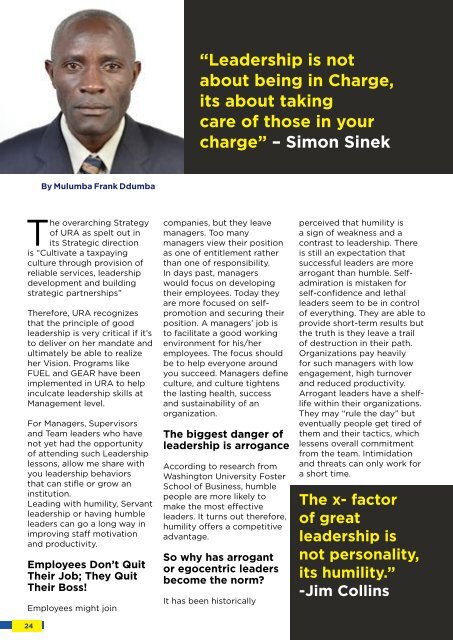TAXMAN
Create successful ePaper yourself
Turn your PDF publications into a flip-book with our unique Google optimized e-Paper software.
“Leadership is not<br />
about being in Charge,<br />
its about taking<br />
care of those in your<br />
charge” – Simon Sinek<br />
By Mulumba Frank Ddumba<br />
The overarching Strategy<br />
of URA as spelt out in<br />
its Strategic direction<br />
is “Cultivate a taxpaying<br />
culture through provision of<br />
reliable services, leadership<br />
development and building<br />
strategic partnerships”<br />
Therefore, URA recognizes<br />
that the principle of good<br />
leadership is very critical if it’s<br />
to deliver on her mandate and<br />
ultimately be able to realize<br />
her Vision. Programs like<br />
FUEL and GEAR have been<br />
implemented in URA to help<br />
inculcate leadership skills at<br />
Management level.<br />
For Managers, Supervisors<br />
and Team leaders who have<br />
not yet had the opportunity<br />
of attending such Leadership<br />
lessons, allow me share with<br />
you leadership behaviors<br />
that can stifle or grow an<br />
institution.<br />
Leading with humility, Servant<br />
leadership or having humble<br />
leaders can go a long way in<br />
improving staff motivation<br />
and productivity.<br />
Employees Don’t Quit<br />
Their Job; They Quit<br />
Their Boss!<br />
Employees might join<br />
24<br />
companies, but they leave<br />
managers. Too many<br />
managers view their position<br />
as one of entitlement rather<br />
than one of responsibility.<br />
In days past, managers<br />
would focus on developing<br />
their employees. Today they<br />
are more focused on selfpromotion<br />
and securing their<br />
position. A managers’ job is<br />
to facilitate a good working<br />
environment for his/her<br />
employees. The focus should<br />
be to help everyone around<br />
you succeed. Managers define<br />
culture, and culture tightens<br />
the lasting health, success<br />
and sustainability of an<br />
organization.<br />
The biggest danger of<br />
leadership is arrogance<br />
According to research from<br />
Washington University Foster<br />
School of Business, humble<br />
people are more likely to<br />
make the most effective<br />
leaders. It turns out therefore,<br />
humility offers a competitive<br />
advantage.<br />
So why has arrogant<br />
or egocentric leaders<br />
become the norm?<br />
It has been historically<br />
perceived that humility is<br />
a sign of weakness and a<br />
contrast to leadership. There<br />
is still an expectation that<br />
successful leaders are more<br />
arrogant than humble. Selfadmiration<br />
is mistaken for<br />
self-confidence and lethal<br />
leaders seem to be in control<br />
of everything. They are able to<br />
provide short-term results but<br />
the truth is they leave a trail<br />
of destruction in their path.<br />
Organizations pay heavily<br />
for such managers with low<br />
engagement, high turnover<br />
and reduced productivity.<br />
Arrogant leaders have a shelflife<br />
within their organizations.<br />
They may “rule the day” but<br />
eventually people get tired of<br />
them and their tactics, which<br />
lessens overall commitment<br />
from the team. Intimidation<br />
and threats can only work for<br />
a short time.<br />
The x- factor<br />
of great<br />
leadership is<br />
not personality,<br />
its humility.”<br />
-Jim Collins


